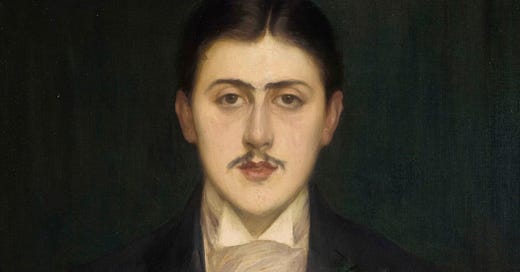Marcel Proust secondary reading list
A selection of 10 titles to help enrich any reading of Marcel Proust.
Today is the 102nd anniversary of Marcel Proust’s death.
Over the years I’ve spent reading his work, I’ve also built up a small library of satellite literature, either directly about, dedicated to, or inspired by him.
As you can likely tell if you’ve dipped into my own book about Proust, he’s the kind of writer that draws other writers to him. There’s a lot of material out there, so I wanted to share a selection of the secondary works I’ve most enjoyed for anyone looking to deepen their understanding of this most enigmatic of authors.
So, here goes:
1. Paintings in Proust by Eric Karpeles
A brilliant illustrated guide to the hundreds of paintings that Proust references during the course of his great novel, from Giotto to Rembrandt to Whistler.
2. Marcel Proust by William C. Carter
At over 800 pages, superbly written, scrupulously researched, and highly readable, this is probably the definitive modern biography of Proust.
3. Marcel Proust: A Life by Edmund White
A far more digestible read, this shorter biography still captures the essence and spirit of Proust, and is especially good on his sexuality.
4. Gate of Lilacs by Clive James
A wonderful book-length poem, as exhilarating as it is enlightening, written by one of the great readers of Proust, and inspired by a lifetime of dedication to In Search of Lost Time.
5. Proust by Samuel Beckett
A short, essay-length book written by one literary great about another, and just what you’d expect: clever, complex, confounding.
6. Lost Time: Lectures on Proust in a Soviet Prison Camp by Józef Czapski
A remarkable short book that contains a series of lectures given on Proust while the author was imprisoned as a POW during WWII. I’ve written in more detail about it here.
7. Proust’s Overcoat by Lorenza Foschini
A wonderful real-life tale about one man’s obsession with Proust and the story of how he acquired the one relic he desired the most: the writer’s old, moth-eaten overcoat.
8. Proust: The Search by Benjamin Taylor
Another biography, again a bit shorter, and also very well written, that goes into greater detail about Proust’s Jewish heritage.
9. Proust’s English by Daniel Karlin
Slightly more academic, but this traces the use of English vocabulary and idioms throughout Proust’s novel, and points to the influence of English culture more widely, from Ruskin on.
10. On Reading by Marcel Proust
This delightful piece was written by Proust himself as a preface to his translation of Ruskin’s Sesame and Lilies, and contains within it the seed of the mighty bloom that was to come.
Several of the above books and more can be found on my Bookshop.org page




